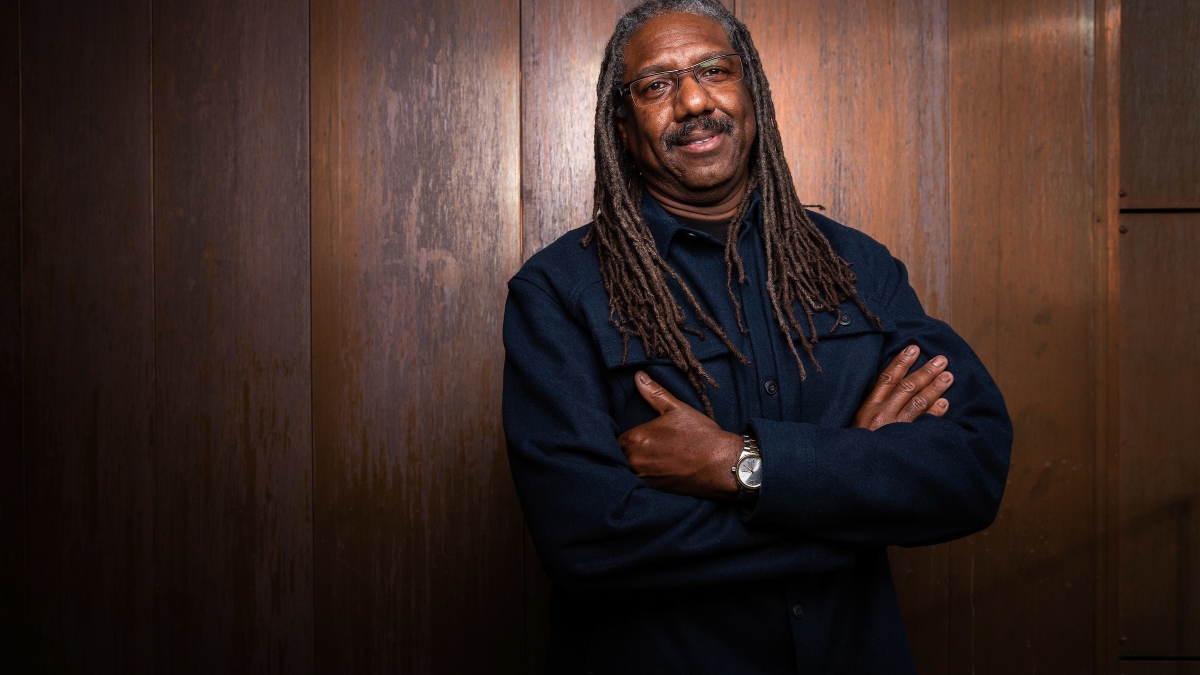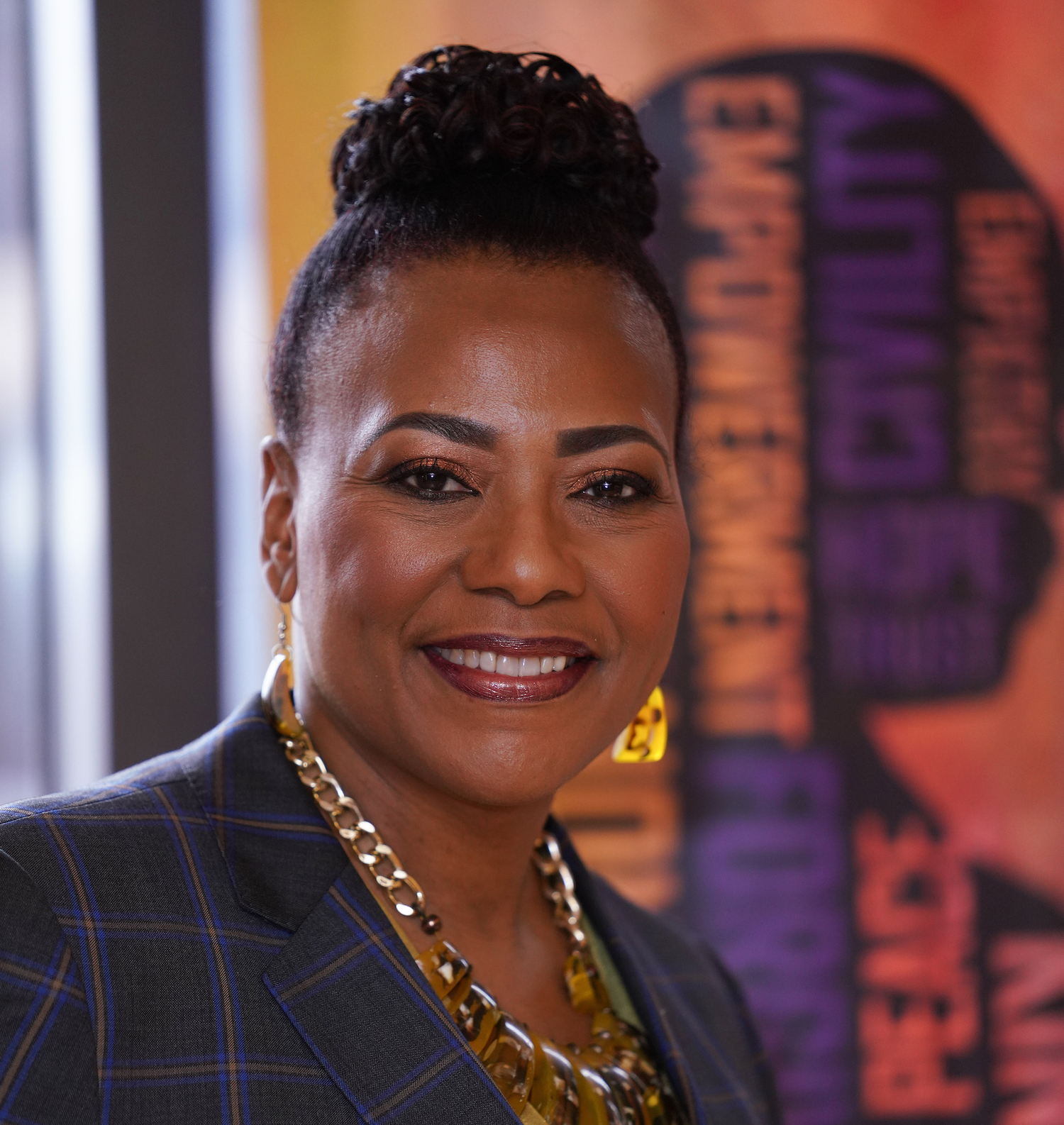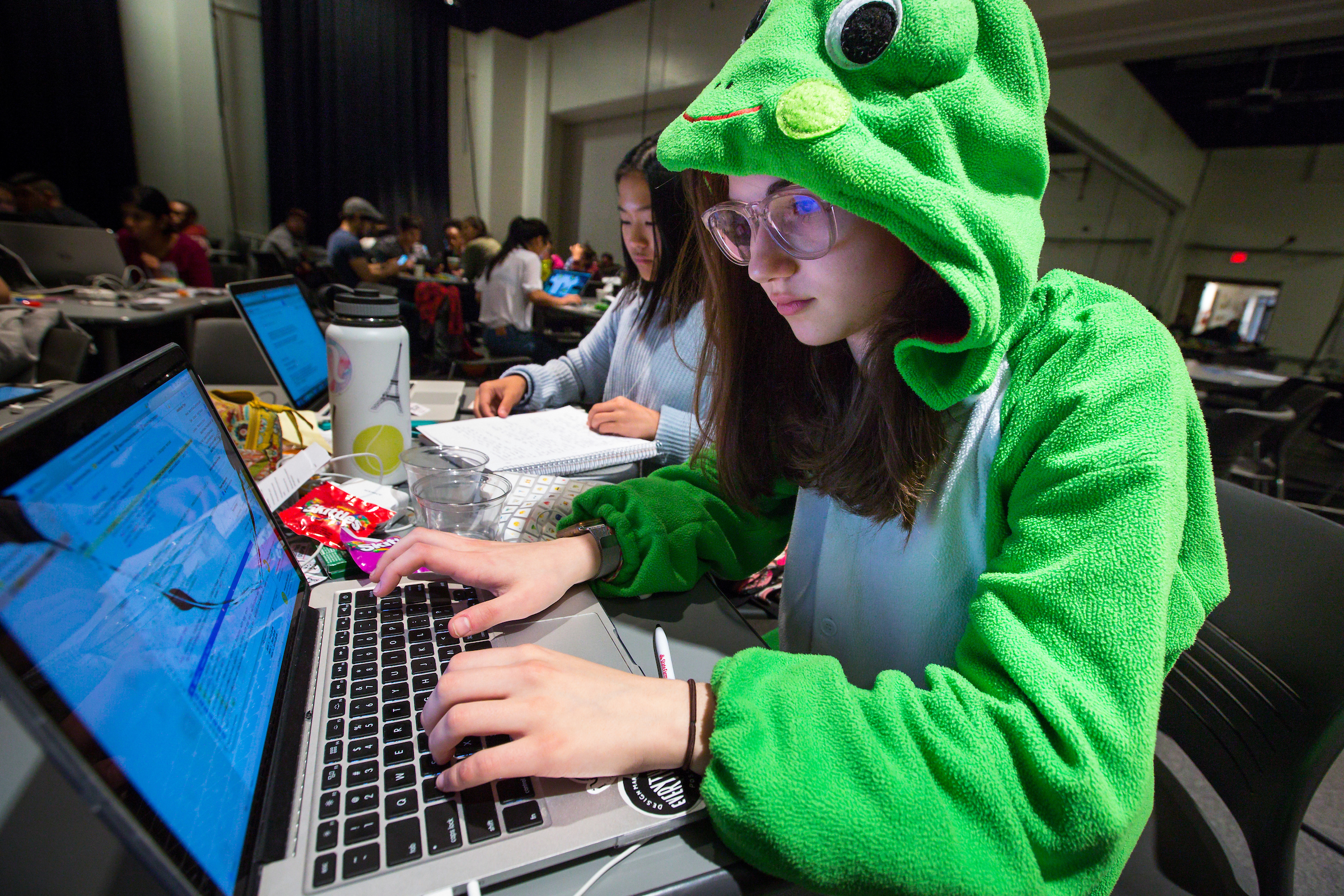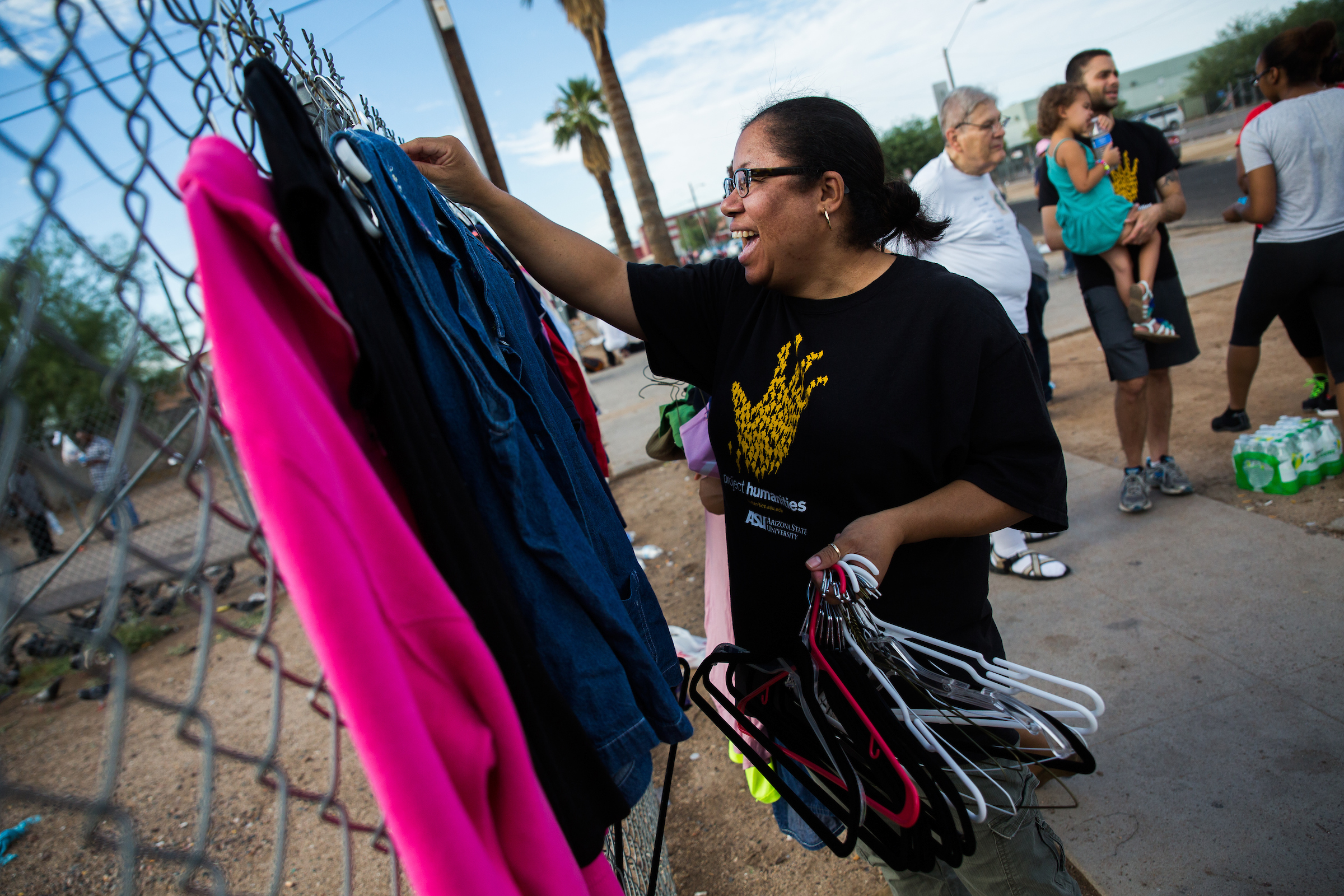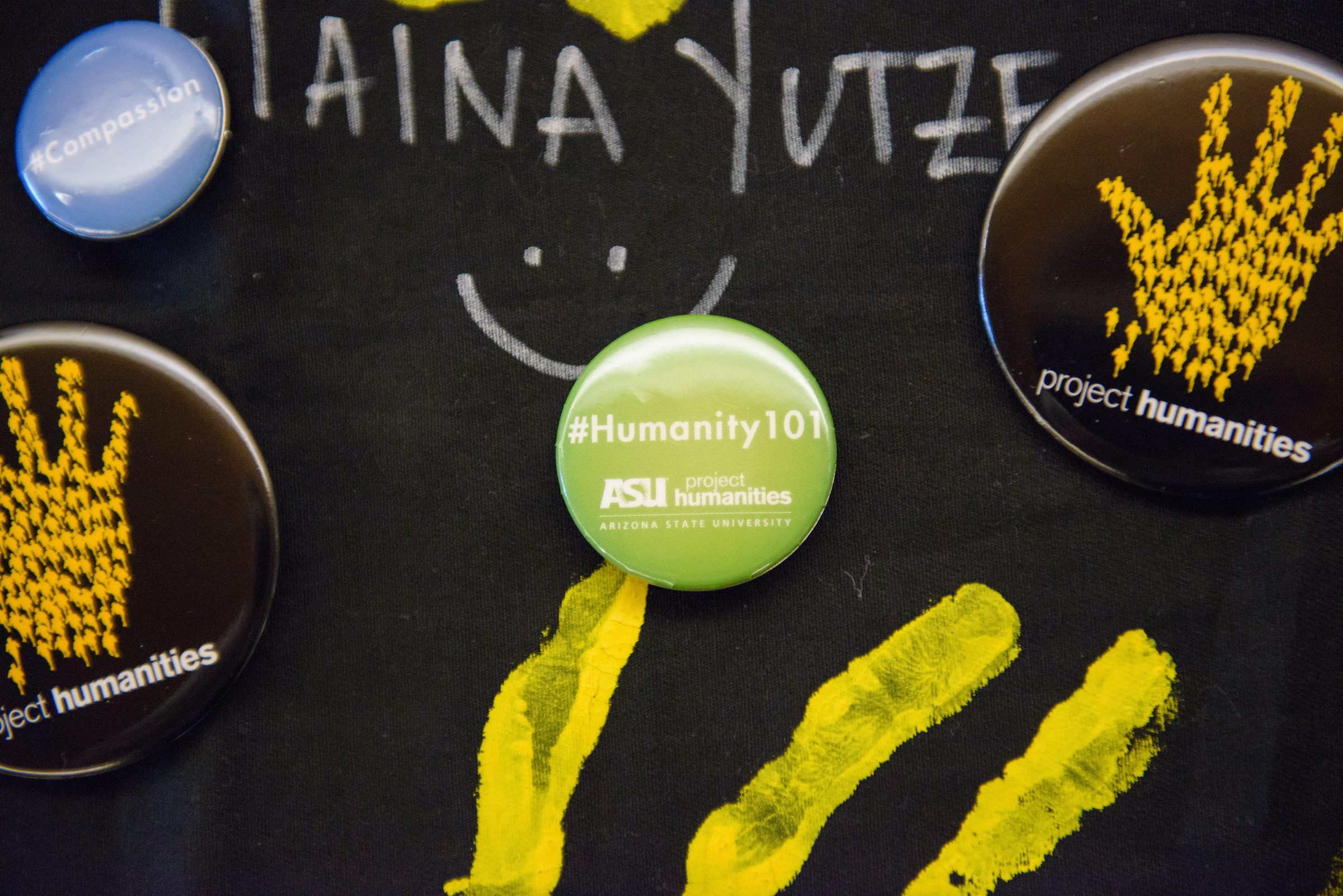Over the past 10 years, Arizona State University’s Project Humanities has received high praise from many dignitaries around the world.
They include a Humanity 101 commendation from the Dalai Lama; an endorsement from Pulitzer Prize-winning author Toni Morrison; and a big thumbs up from Valley resident and former NFL quarterback Kurt Warner.
Bernice A. King
And now Bernice A. King, daughter of civil rights icon Martin Luther King Jr., will help celebrate the initiative’s 10th anniversary with a special virtual conversation with Neal A. Lester, Foundation Professor of English and founding director of Project Humanities.
“We could not be more excited to commemorate this 10-year milestone as an opportunity to engage Dr. Bernice King in our efforts to look back on our accomplishments and to think about what the next years of Project Humanities’ impact and reach will look like,” Lester said.
Billed as “Looking Back to Move Forward: Are We Losing Our Humanity?”, the event is expected to draw more than 1,000 people to watch the livestream event at 2 p.m. (MST/Arizona time) Saturday, Nov. 13. Go here to register.
King, a minister, attorney, orator, peace advocate and chief executive officer of the Martin Luther King Jr. Center for Nonviolent Social Change, will join Lester in a discussion of the interconnectedness of justice, diversity, equality and humanity.
“We are honored to be in conversation with one whose fingers are on the pulse of what’s happening right here in the U.S. and beyond in terms of racial and social justice,” Lester said. “We know that Dr. Bernice King will bring much proverbial food for thought and will challenge all of us to be better and to do better.”
King’s appearance concludes the multiple award-winning initiative’s 10th anniversary campaign of spring, summer and fall programming. This included a signature lecture series, a second Podcast Club season, film screenings, a global hackathon, workshops, community conversations, a homeless-outreach monthly Donations Challenge, new community and corporate partnerships, and a new TalklineThe phone number for Project Humanities Talkline is 480-378-7710. where supporters share up-to-three-minute personal stories about the impact Project Humanities has had on their lives.
People are drawn to Project Humanities because it has never lost sight of its core mission: “talking, listening and connecting,” Lester said.
And there’s still more to come in the next decade, he promises.
A small initiative with big ideas
When Project Humanities launched in 2011, Lester’s charge by ASU President Michael Crow was to “make the humanities more robust.”
Then the dean of humanities in The College of Liberal Arts and Sciences, Lester took up the challenge in the most trying of times. The economy took a downturn, and students were fleeing humanities majors and disciplines.
Lester wanted to demystify the humanities and to challenge traditions and boundaries by taking the humanities out of the sometimes-believed-to-be exclusive university setting by going into the various communities within and beyond ASU. It was a move that endeared him to Valley residents and community leaders alike, and the initiative began developing a strong following.
“We don’t necessarily belong in places where we pack the house with thousands of people, although we do have events that attract hundreds,” Lester said. “We like more intimate settings and getting to know people, people getting to know each other and people getting to know us.”
Project Humanities holds events in community centers, churches, movie theaters, parks, lawns, theaters, restaurants, art spaces and other intimate spots around the greater Phoenix area. Topics have included arranged marriages in India, suicide prevention, LGBTQIA+ and intersectionality, romance and autism, death and dying, parenting across cultures, menstrual equity, racial and environmental justice, religious dogmas and doctrines, body positivity, critical race theory, drag queens and drag kings, mental health, Sikhism 101, and transgender athletes.
The initiative also has a gift of getting people from both sides of the aisle and all walks of life to sit down and talk with each other in a meaningful way, if only for a moment in time.
In a 2019 event, Project Humanities got Christians, Satanists, Hare Krishnas, witches, pagans and polytheists to discuss their religious and worldviews in a standing-room-only crowd. The year before, Project Humanities facilitated a community discussion that had Republicans and Democrats sharing a meal while discussing civics and personal responsibility in these especially politically and socially divisive times.
How does Project Humanities manage to pull this off time and again?
Lester says he is willing to take a chance on subjects that society doesn’t like to talk about and gets participants and the Project Humanities team to step out of their comfort zones and to have an open mind, himself included.
Valley resident Joe Kerkhove said Lester once challenged him at an Ahwatukee chapter of Boys Team Charity community service talk two years ago, while making a pitch for Service Saturdays.
“I recall making a statement about ‘people being normal’ and I had been properly challenged about ‘what’s normal,’” Kerkhove said. “That has stuck with me to this day. We are all unique and all deserve to be respected as individuals.”
Lester believes open and honest dialogue can open doors and move mountains.
“This country is in a perpetual moment of great divisiveness, and there’s so much pessimism about the future,” Lester said. “But we can all come together and find solutions and interventions if we can just get together, talk, listen and work together. As our Project Humanities graphic embodies, we can be as separate as the fingers yet one as the hand in matters of social progress, however we define ‘progress.’”
Hacking, podcasting and ambassadors
Project Humanities has learned over the years that connection comes in many forms. In addition to creating innovative programming, in 2013, the group launched the now hugely successful annual "Hacks for Humanity: Hacking for the Social Good" event, which challenges intergenerational, multi-professional and multi-communal participants to create technical solutions for the social good.
Unlike many hackathons, Hacks for Humanity encourages participants from a wide skill set — especially those who have no “hacking” experience. The 36-hour global and virtual event draws coders and non-coders, futurists, artists, activists, educators, scientists and social workers to focus on the biggest issues individuals, families, communities and the world are facing. Such topics over the years have included health care, education, the Earth, safety, aging, parenting, water, transportation and sports.
Fifteen-year-old Ari Sokolov works on her group's project during the 26th hour of the 36-hour competitive Hacks for Humanity in 2016. Photo by Charlie Leight/ASU News
Within the topics offered any given year, teams of three to five randomly assigned participants are required to implement at least three of the seven principles Project Humanities identifies as Humanity 101 into their technology products: kindness, compassion, integrity, respect, empathy, forgiveness and self-reflection. Project Humanities sees these principles not as faith-based ideas and ideals, but as the foundation for all successes — in families, in communities, in the workplace and beyond. Inherent in the intentional practicing of these principles are diversity, inclusion, equity and justice.
This year’s Hacks for Humanity, which drew approximately 150 people, included participants from India, the Philippines, Ghana, Peru, Morocco, Nigeria, Singapore, Germany and the Fiji Islands.
The attributes Project Humanities touts are what attracted the fiscal attention of the Come Rain or Shine Foundation.
“Observing Dr. Lester in action within the community sparked our interest in Project Humanities,” said James D. Tuton, whose foundation donated $25,000 twice to Project Humanities to create a new Parenting and Humanity initiative in 2019. “Dr. Lester has the unique ability to instantaneously create an emotionally safe place for people to connect and share their differing worldviews.”
Last year saw the debut of “Talking, Listening and Podcasting with ASU Project Humanities.” It’s essentially an extension of the award-winning initiative’s event series and was designed to keep community conversations going during the pandemic when in-person gatherings were discouraged.
The series has been so successful that Project Humanities decided to continue it, and in June, the series will enter its third season with co-facilitated hourlong virtual conversations led by Project Humanities high school interns, staff, ASU graduate students and community members. Topics have included defunding the police, youth and mental health, modern-day voter suppression, corporal punishment and Black parenting, anti-speciesism, menstrual equity and police destroying rape kits.
One of the outgrowths of the podcast series is that it draws a much wider audience and is giving Project Humanities international visibility. Barbara Anderson is a retiree from Iowa who frequently watches the livestream events. She was particularly impressed by a July 2021 show called “Decriminalizing the War on Drugs,” hosted by Project Humanities interns Jessie Valvo, Afzal Ariff and Sai Vadnerkar.
“Thanks to you and your interns for bringing this timely and so important issue to the forefront,” Anderson wrote to Lester in a July 15, 2021, email. “This is such a relevant conversation we should all continue to have and continue to learn about.”
Internships at Project Humanities are not just academic obligations to earn credit; they’re life-changing. Just ask Olivia Oldham, a senior at ASU majoring in psychology.
“I love attending the events, and I’ll never forget the things I’ve learned,” said Oldham, who is one of a handful of Project Humanities interns. “This opportunity has really taught me to put myself in other people’s shoes, and it has changed my life. It’s been wonderful.”
As part of Project Humanities’ 10th anniversary, the initiative recently announced a new Undergraduate Research Ambassadors Program. It allows for ASU undergraduates to explore a social justice issue, work with an ASU faculty mentor and publicly present their findings in a Project Humanities event. Selected students receive a $2,500 stipend to support their work during the spring 2022 semester. The faculty mentor receives a modest stipend as well for lending their guidance, time and expertise to the student's development.
Supporting those experiencing homelessness
Lester said that even though Project Humanities has many irons in the proverbial fire and has drawn a lot of attention from so many corners of the globe over the years, a homeless outreach that started in 2016 most likely will be the initiative’s legacy because of its regularity and its immediacy in terms of witnessing “Humanity 101 in action.”
Service Saturdays provides a place where people of all backgrounds join together to distribute shoes, clothing and toiletries twice a month to over 200 individuals experiencing homelessness in downtown Phoenix.
The outreach program started with a handful of volunteers storing items in their respective garages, then converging on 12th Avenue in downtown Phoenix with tarps to lay out clothing, shoes and toiletries for waiting unsheltered clients.
That operation has grown exponentially in size and efficiency to meet a growing need as mirrored across the United States. Lester said the reason is that it’s an opportunity to serve as well as for deep self-reflections on class, race, gender, age, mental health, suffering, loss and human connection.
Project Humanities volunteer Addie Sutherland of Tolleson helps collect shirts and hangers at the end of a 2015 Service Saturdays event. The twice-monthly event distributes shoes, clothing and toiletries to those in need. Photo by Deanna Dent/ASU News
That’s what appealed to Wendy Eischen, who volunteered to help out with Hacks For Humanity in 2018, then connected to Service Saturdays because it moved her heart.
“I have volunteered for a lot of other organizations over the years, but this program was more open, welcoming and had a ‘do what you can’ atmosphere,” Eischen said. “It feels good to come here, do your part and talk to people. You feel like you’re making a difference, even if it’s sorting out clothes or whatever. It takes me out of my homogeneous environment.”
Eischen said in the three years she has volunteered with Service Saturdays, she has befriended many people experiencing temporary and permanent homelessness.
“I’m just here to hand out some things to people, and if some of them want to chant, then we have a chat,” Eischen said. “That simple interaction of human to human is what I really like about Service Saturdays.”
For grandson and grandfather Santiago and Laray Todd, Service Saturdays gives them an opportunity to bond while sharing their humanity with others. Laray, who is in his late 60s, lives in Prescott but visits his grandson Santiago every Friday for afternoon donation sorting and every other Saturday for the early morning distribution.
“We started about three years ago when Santiago was 13 and needed some school credit for community service, so I decided to join him for Service Saturdays,” said Laray, an Army veteran and retired pilot. “It’s been a marvelous experience to see my grandson and experience something on a deeper level than just visiting. He gets to meet some fine people who find themselves in circumstances where they found that turn in the road that can go one way or the other.”
Santiago admits he wasn’t crazy about Service Saturdays in the beginning, mostly because he didn’t like getting up at 4 a.m. on the weekend.
"It was an obligation and a pain in the butt, yeah,” Santiago said. “But over time, I grew to liking it and spending time with my grandfather. It’s brought us closer together, and it’s something I’ll cherish forever.”
Santiago said being involved with Project Humanities has also made him a better person.
“It has enriched my thought process and has advanced me as a person,” Santiago said. “I have respect for every single person I meet because now I view everyone as a human being.”
Still hungry after all these years
Despite all the accolades, awards and success, Project Humanities has retained its hunger to bring all walks of life together, to make people open to others’ ideas, to help them become more empathetic to others, and to battle cynicism and hopelessness.
Those traits are what attracted Alycia de Mesa to the initiative. She is serving as Project Humanities’ first associate director.
“Project Humanities literally encompasses all eight of ASU’s design aspirations and taking the best of what we do in the classroom, pedagogy, multidisciplines and intersectionality — not only humanities but liberal arts, sustainability, social justice, technology — and brings it all together,” said de Mesa, who is also a faculty instructor with ASU’s School of Sustainability. “All of this in itself is unique, but what I think takes it further is this continued focus on humans and taking the message out into the community.”
It’s the same reason that Rachel Sondgeroth has stayed with Project Humanities for so long.
“Project Humanities hitting this milestone of 10 years feels very nostalgic to me,” said Sondgeroth, a coordinator with Project Humanities. “I first encountered Project Humanities as a Texas high school student eight years ago with the question, ‘Are we losing our humanity?’ At the time, Project Humanities was raising in its programming this very same question. I’ve been supporting this initiative wholeheartedly ever since.”
One of Project Humanities' programming initiatives, Humanity 101, responds to the question: “Are we losing our humanity?”
Sondgeroth added that one of her favorite points of growth is how Project Humanities is a current Valley leader in critical conversations surrounding some of the most important issues of our time.
It’s also why Lester continues stumping for the initiative, talking about the humanities to anyone who will listen, and creating opportunities for others to see how they can contribute to the greater good.
So, when staff at Mirabella at ASU, a new intergenerational living and lifelong learning complex at the edge of the Tempe campus, invited Lester to discuss Project Humanities, he didn’t hesitate to stop by to engage his new neighbors.
On Aug. 5, Lester spoke to a group of about 30 residents, who are age 62 and older. On this day, they were eager to hear about programming, volunteer opportunities and how they can be a part of the movement.
“You don’t have to major in history to be a critical thinker. You don’t have to major in language to be a critical thinker,” Lester said. “We want people to be critically engaged and inclusive, and to feel included.”
That resonated with Mirabella resident Mary Estelle Amberg, a retired teacher and life coach.
“I have done work on emotional intelligence with people, and so much of what Professor Lester said is congruent to what he said today,” Amberg said. “I can see myself attending a few of the lectures Project Humanities has planned this year, especially the one on forgiveness. I need to learn how to forgive.”
That honesty is typical when people step into the world of Project Humanities and allow themselves to be vulnerable and continue to learn.
It’s also why Lester continues to bring the humanities to the public and plans on doing so for another 10 years or more.
“To watch Project Humanities evolve into this respected and visible community and academic leader is both gratifying and challenging. We know that folks are watching, anxious to see what we do next. And we are just as anxious in our anticipation,” Lester said. “We know that this is not a time to rest on our laurels but rather a time to ask ourselves what else can we do that we are not doing to enhance the quality of someone else’s life, however that enhancement takes form.”
Top photo: Neal A. Lester, founding director of ASU's Project Humanities. Photo by Deanna Dent/ASU News
More Law, journalism and politics

LA journalists and officials gather to connect and salute fire coverage
Recognition of Los Angeles-area media coverage of the region’s January wildfires was the primary message as hundreds gathered at ASU California Center Broadway for an annual convening of journalists…

A new twist on fantasy sports brought on by ASU ties
A new fantasy sports gaming app is taking traditional fantasy sports and mixing them with a strategic, territory-based twist.Maptasy Sports started as a passion project for Arizona State University…

'Politics Beyond the Aisle' series to explore the stories of public officials
In an effort to build a stronger connection between students and political and civic leaders, Arizona State University’s School of Politics and Global Studies hosted the first event of its new series…


